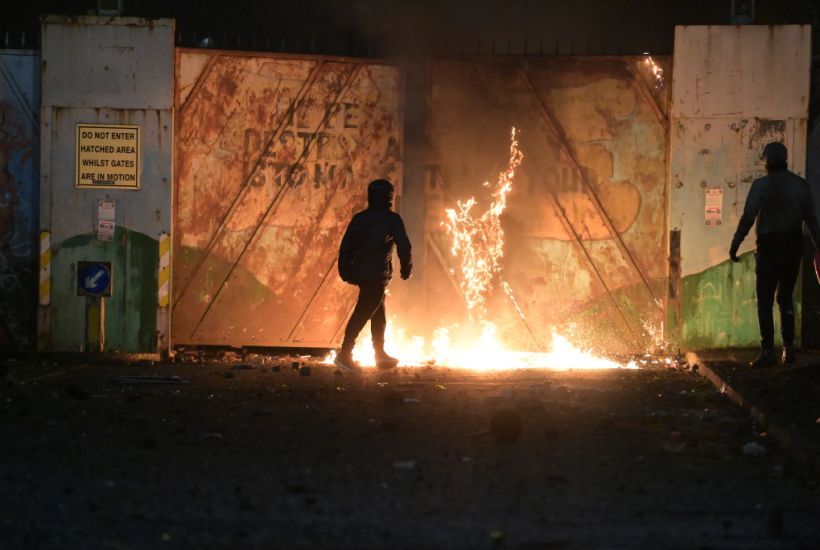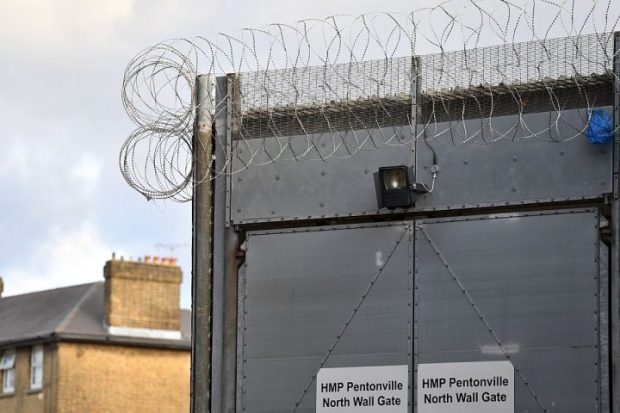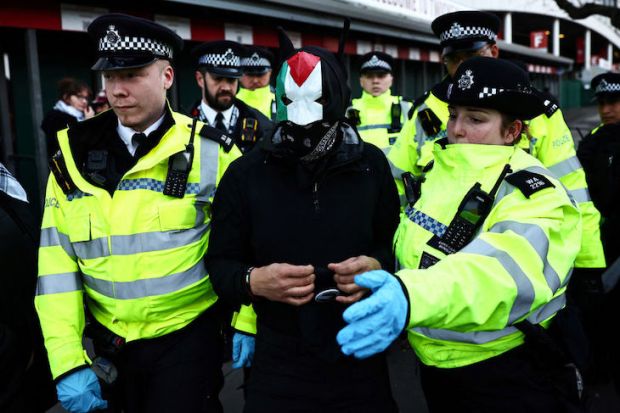Northern Ireland is routinely voted one of the happiest places to live in the UK. A few weeks ago, a survey revealed that Belfast was the best city to raise a family in Britain. The Province is in the top ten digital economies of the future. A world-class film production industry is transforming it into the Hollywood of Europe adding tens of millions of pounds to the local economy. It’s a stark contrast to the ugly scenes from over the Irish Sea flashing across our screens this week.
Working-class loyalist communities are in a dangerously mutinous mood that is hard to square with this parallel world. Alienation and opportunity often exist in the same postcode, literally a stone’s throw away.
Outrage at the apparent collusion of Sinn Fein with the police service to put on a show funeral for a high-profile IRA terrorist during the Covid crisis is a handy explainer. The imposition of a post-Brexit trade border in the Irish Sea, dividing Great Britain from Northern Ireland, is another source of contention, leading to the five nights of mayhem that has left dozens of police officers injured. Areas where Catholic and Protestant kids, separated by ‘peace walls’ over a few lines of liturgy they’ve probably never read, trading petrol bombs and stones adds to the drama.
But these recycled media tropes are merely the accelerants on tinder that has been drying for years. Loyalist communities are suffering a dangerous crisis of morale that is, on the face of it, hard to fathom. IRA terrorists, having failed to murder loyalists out of their British identity, surrendered their arms. Now their political proxy sits in place in a devolved UK administration; it’s about as far away from the IRA’s 32 County Republican socialist utopia as it’s possible to get. Yet the imminence of constitutional peril remains central to the psyche of Protestant tribes who venerate the historic blood sacrifice in defence of Britishness written across war memorials in every Ulster town and village. This existential threat, if not killed off, was at least anaesthetised by the skilful ambiguities of the Good Friday Agreement.
And then Brexit. While Northern Ireland’s remain majority was pushed over the line by Unionists who saw the danger, the numbers have been co-opted by Republicans into a narrative that has injected urgency and justification for a border poll. Those who want Northern Ireland to fail know the best way to demonstrate its weakness – and therefore the case for its destruction – is to undermine the reliably febrile security of its working-class unionist citizens. Of course, those who want to exploit that paranoia on the Loyalist side do precisely the same, while politicians either look on impotently or look the other way, with the police stuck in the middle.
The disorder over Easter is a sign of this lost-ground pathology in a fight that can’t be won. While the ongoing violence has at last penetrated the consciousness of national media and the Prime Minister, it is sporadic and limited to relatively few locations. These places are often little more than criminal fiefdoms, areas where decent people are trapped under the coercive control of former Loyalist paramilitaries, who have moved from selling ideology to recreational drugs. Such people have been appeased and even underwritten by a state blackmailed into submission for fear of a return to the gun and the bomb.
If you’re looking for the reason why kids as young as thirteen have been mobilised into chucking petrol bombs, look no further than the gangsters hanging back and watching. Unlike many working-class Republican communities in places where there are similar levels of deprivation, there is a dearth of political representation that speaks for and about working-class Loyalists. The life chances of young men in deprived Protestant neighbourhoods have been blighted for years. There is little sign of the economic boost that is so necessary to stamp out the embers of violent extremism glowing brightly just now.
The mural on a Loyalist estate outside Derry where there has been trouble this week reads: ‘We have given so much, we have much to give.’ It would be a mistake for those who care about Northern Ireland to ignore the potency at either end of this declaration.
Unionist politicians must find a way to reconnect with their restive base and curtail this ruinously counter-productive violence. The Irish Taoiseach must continue his principled refusal to join with (mostly Northern) Irish unity fundamentalists who recklessly push for a divisive border poll and instead stay focused on his concept of a shared island. The UK Government must look with urgency at targeting economic recovery and stimulation at deprived neighbourhoods in Northern Ireland that account for so much of the continuing violence and terrorist threat. The police must stop policing politics and start shutting down the parallel societies run as criminal fiefdoms where the rule of law is laughed at. The Northern Ireland Executive must focus unashamedly on bringing working-class Protestant boys at the bottom of the attainment charts in from the cold, taking their potential off the street corner and into prosperity.
You can’t eat flags but flags are much more palatable if you can’t eat. Without this focus, Loyalists will remain an unsettled people with nowhere else to go and plenty of people to lead them there. And that is a recipe for chaos.
Got something to add? Join the discussion and comment below.
Get 10 issues for just $10
Subscribe to The Spectator Australia today for the next 10 magazine issues, plus full online access, for just $10.




















Comments
Don't miss out
Join the conversation with other Spectator Australia readers. Subscribe to leave a comment.
SUBSCRIBEAlready a subscriber? Log in